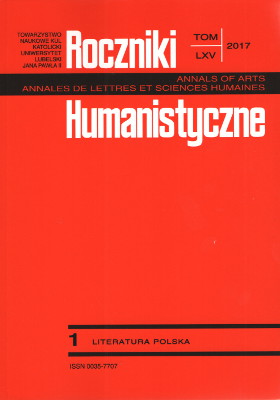Oblicza inności a dialog polsko-ukraiński w perspektywie narracji reportażowych o tragedii wołyńskiej w latach 1943-1944
Facets of the Other and the Polish-Ukrainian Dialogue from the Perspective of Reportage Narratives on the Volhynia Tragedy in the years 1943-1944
Author(s): Angelika KowalikSubject(s): Language and Literature Studies, Studies of Literature, Polish Literature
Published by: Towarzystwo Naukowe KUL & Katolicki Uniwersytet Lubelski Jana Pawła II
Keywords: Witold Szabłowski; Marek Koprowski; Polish-Ukrainian dialogue; Other; Foreign; Volhynia; reportage
Summary/Abstract: The article compares two collections of reportages concerning the events in Volhynia in the years 1943-1945: Witold Szabłowski’s Sprawiedliwi zdrajcy. Sąsiedzi z Wołynia [Righteous Traitors. Neighbors from Volhynia] and Marek Koprowski’s Wołyń. Mówią świadkowie ludobójstwa [Volhynia. Witnesses of the genocide are speaking]. The author shows that the fundamental feature that differentiates both texts is the way of addressing the Other, understood as a representative of the Ukrainian nation. Szabłowski’s interviewees are Ukrainians, from whom the reporter tries to obtain information about their compatriots rescuing Poles during the massacres. In this way, he gives voice to the Other, treating him as an equal partner in the dialogue about the past. By contrast, Koprowski’s interlocutors are exclusively Poles. The image of a Ukrainian that emerges from his collection of reportages is negative: for a Pole a Ukrainian is a Foreigner. The Polish identity, which can be reconstructed on the basis of the statements made by Koprowski’s interlocutors is devoid of an important reference point, which is ethnic otherness enabling a fuller and critical look at one’s own nation. The consequence of the perspectives adopted by the authors is a different way of constructing the Polish identity in which the trauma of Volhynia events is inscribed. A comparative analysis of both texts allows to distinguish two ways of how memory works and leads to the reflection on the influence of using the category of otherness in the reportage genre on the possibility of conducting the Polish-Ukrainian dialogue.
Journal: Roczniki Humanistyczne
- Issue Year: 65/2017
- Issue No: 1
- Page Range: 103-124
- Page Count: 22
- Language: Polish

